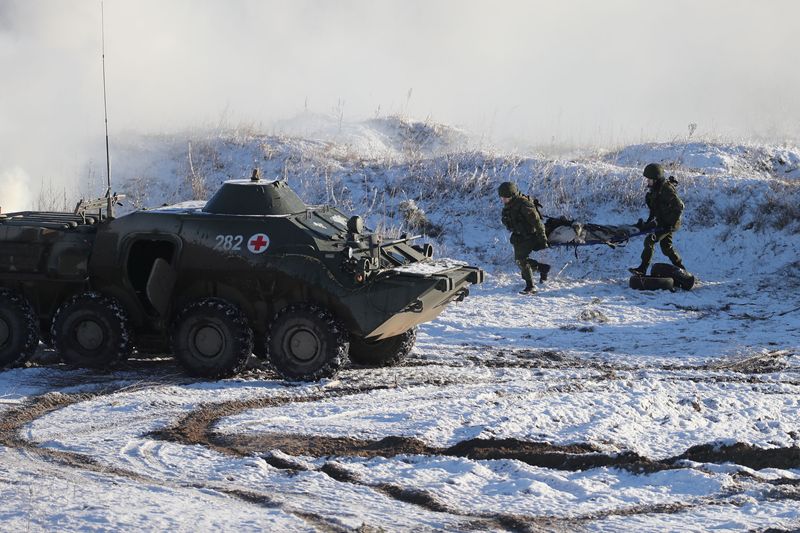By Andrey Ostroukh and Alexander Marrow
MOSCOW (Reuters) - The rouble rose more than 2% versus the dollar on Tuesday as Russia said some troops near Ukraine were returning to their bases after military exercises, easing concerns over a potential invasion that had fuelled a Russian asset sell-off last week.
Following days of U.S. and British warnings that Moscow might invade its neighbour at any time, Russia's statement that it was withdrawing some forces from near the border helped the currency, stocks and bonds rebound.
Russia has repeatedly denied it plans to invade Ukraine. NATO said it had yet to see any sign of de-escalation on the ground.
By 1252 GMT, the rouble was 2.1% stronger against the dollar at 75.15, close to recouping all losses sustained in the currency's sharpest single-session drop in nearly two years on Friday.
The rouble strengthened 1.7% against the euro to 85.28.
"Market sentiment remains highly fragile, so volatility is bound to stay high," Sberbank CIB said in a note.
On Monday, the currency climbed after Russian Foreign Minister Sergei Lavrov suggested to President Vladimir Putin that Moscow should continue along the diplomatic path in its efforts to extract security guarantees from the West.
Dmitry Polevoy, head of investment at Locko Invest, said the currency's reaction to those words showed that a single phrase can be sufficient to move the rouble strongly in either direction.
"We still believe the rouble is likely to rise from these levels," he said, adding that the rouble has lagged other emerging market currencies by 5% to 7% this year.
One development that may complicate the currency's growth trajectory was parliament voting to appeal to Putin to recognise two Russian-backed breakaway regions in eastern Ukraine as independent.
Recognition of the two regions could unravel the existing Minsk peace process for east Ukraine to which Russia has said it is committed.
"The shuttle diplomacy continues – as long as the West remains vocal on the issue, the market will continue to follow headlines, with the binary outcome (a further deterioration vs conciliation) suggesting significant up/downside," BCS Global Markets said.
Yields on Russia's 10-year benchmark OFZ bonds eased to 9.81% after spiking above 10% for the first time since February 2016 on Monday. Yields move inversely to prices.
Russian stock indexes were up, recovering after a sell-off in the previous two sessions.

The dollar-denominated RTS index rose 5.6% to 1,505.1. The rouble-based MOEX Russian index was up 3.1% at 3,590.9.
Shares in internet giant Yandex (NASDAQ:YNDX) rose 7.5%, outperforming the wider market after the company reported full-year results and said it is eyeing $6.5 billion in revenues in 2022.